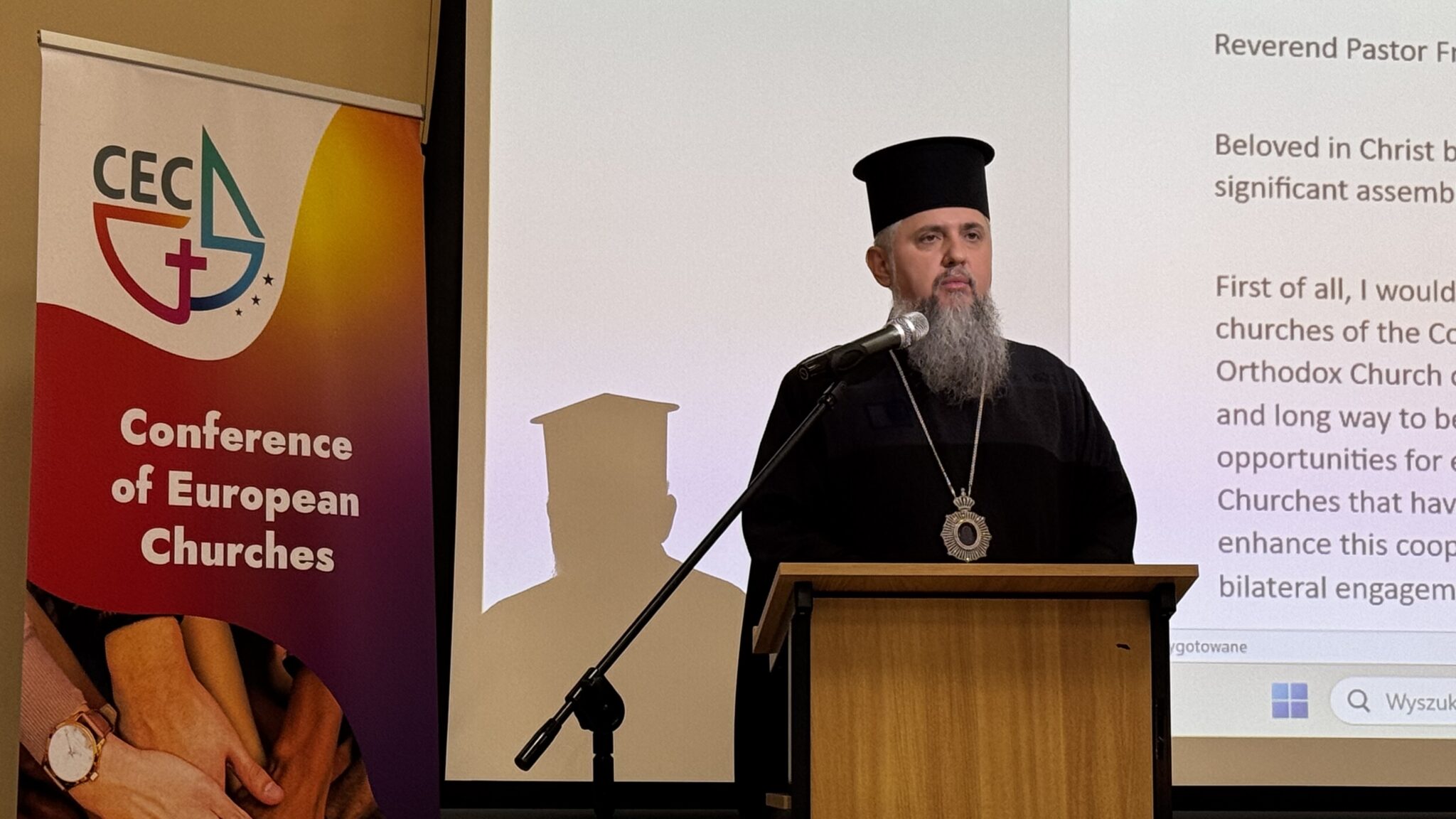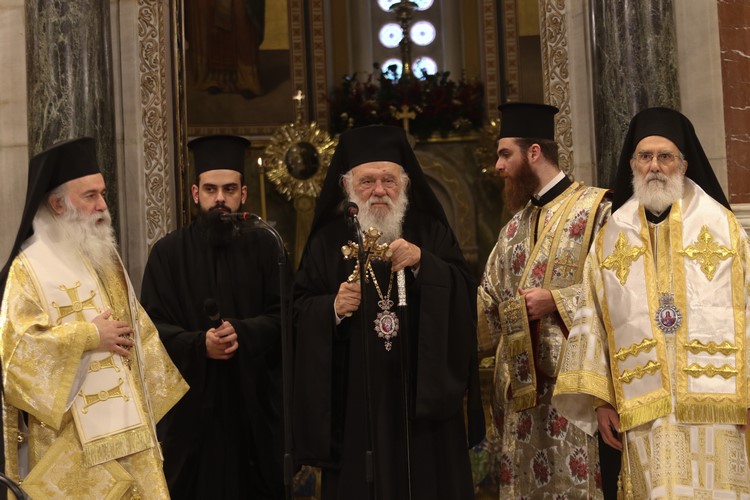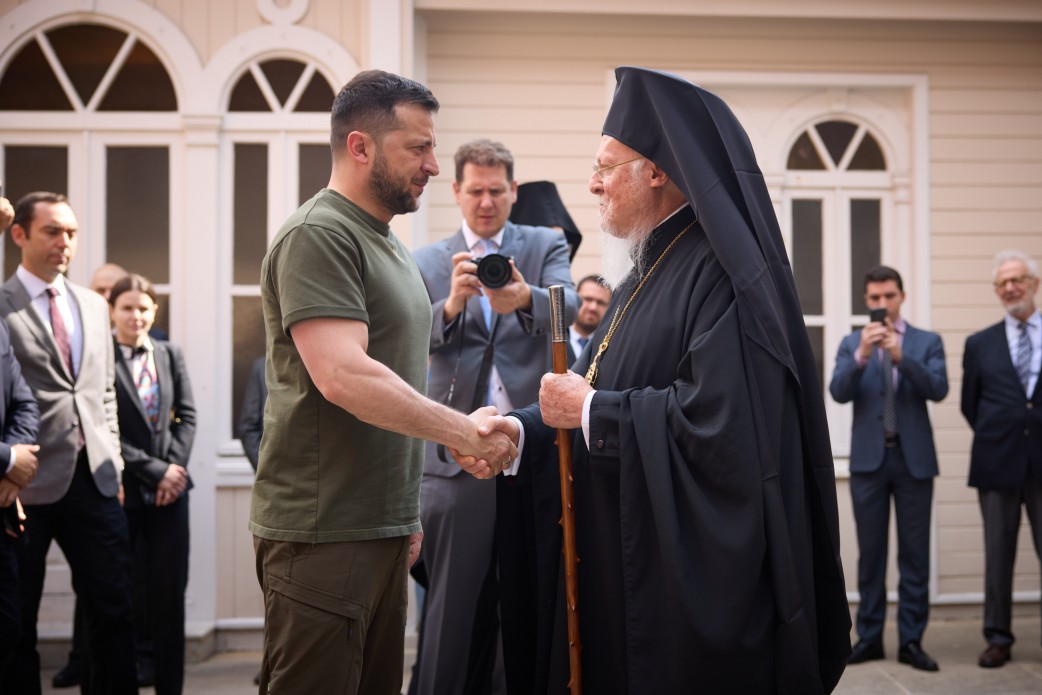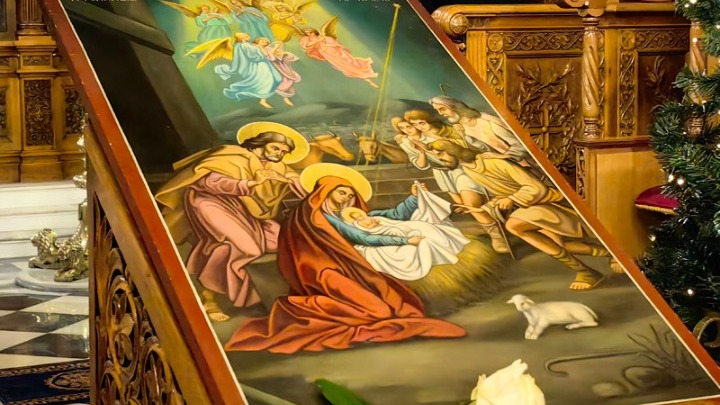Metropolitan of Kyiv issues new appeal for dialogue with Metropolitan Onufriy


Metropolitan Epifaniy of Kyiv issued a new appeal for dialogue with Metropolitan Onufriy of the Ukrainian Orthodox Church (Moscow Patriarchate), this time from the platform of the Conference of European Churches.
In his speech, Metropolitan Epifaniy referred to the methods used by the Russian Orthodox Church since the time of the Soviet Union, which he said are still being used today.
As he stated: “Anyone who observes the ecclesiastical situation in Russia cannot deny that the system of controlling the activities of the Church, which existed during the Soviet Union, not only remained in force after 1991, but, on the contrary, developed into a deeper collaboration based on the common ideology of the ‘Russian world.’”
He added that after the defeat of the Third Reich “the German churches, together with the people, underwent a process of denazification. In contrast, the Russian Orthodox Church systematically ignored numerous indications of its collaboration with the secret services and “failed to purge itself of the consequences of its collaboration with the Soviet Communist Party.”
Metropolitan Epifaniy further emphasised that the return of power to the hands of the KGB after Putin’s election also entailed the revival and deepening of the system of cooperation between the Kremlin and the Moscow Patriarchate that existed during the USSR.
As a telling example, he cited the Department for External Church Relations of the Moscow Patriarchate, which was headed by current Patriarch Kirill of Moscow, then serving as Metropolitan.
He reiterated the need for dialogue between the Autocephalous Orthodox Church of Ukraine and the Ukrainian Orthodox Church “without preconditions.
“We really want to engage in dialogue, and I cannot agree with those who insist on blaming the Orthodox Church of Ukraine for the fact that Metropolitan Onufriy is blocking its initiation.”
Referring to incidents in certain communities, he added that these were caused by “the deliberate obstruction of any dialogue by Metropolitan Onufriy and his hierarchs and the incitement of conflicts within the communities.
He emphasised that for the dialogue to be meaningful, the participation of both churches must be at an equal level. “It cannot be that on our side the participants are officially authorised representatives of the Primate and the Synod, while on the side of Metropolitan Onufriy’s jurisdiction they are unofficially authorised laymen or parish priests whose positions can be declared at any moment as personal opinions and who have no influence on the decisions of Metropolitan Onufriy’s Synod.”
Find below the homily of Metropolitan Epifaniy of Kyiv and All Ukraine
Your Eminence Archbishop Nikita, President of the Conference of European Churches!
Reverend Pastor Frank Dieter Fischbach, Secretary General of the CEC!
Beloved in Christ brothers and sisters, esteemed participants of this significant assembly.
First of all, I would like to take this opportunity to thank the member churches of the Conference once again for their decision to admit the Orthodox Church of Ukraine to its ranks. We have passed a complicated and long way to becoming a member, and we highly appreciate the new opportunities for ecumenical cooperation with the family of European Churches that have opened up for us owing to the CEC. We wish to enhance this cooperation both on a multilateral basis and through bilateral engagement with all stakeholders.
I would also like to express my gratitude to all the churches that have responded to the challenges posed by Russia’s aggression against Ukraine. We appreciate the humanitarian assistance you have provided and continue to deliver. We are grateful for the aid provided to Ukrainian refugees and for the support in meeting their spiritual needs. And, of course, we are constantly grateful for your prayers for the triumph of the truth and the achievement of just peace for Ukraine.
I am sure that this is a common view of all those who are here from Ukraine – we are asking you to continue this prayer for the victory of the truth and a just peace. Because this prayer and your Christian testimony is a significant and essential contribution to the victory of the Good.
For more than a thousand days, Russia’s full-scale hybrid aggression against Ukraine has been underway. And one of its key aspects is the Kremlin dictatorship’s instrumentalization of the Russian religious community, involving the Russian Orthodox Church and its worldwide allies in approving and theologically justifying the war.
We are all witnesses to the fact that it is not only the Moscow Patriarchate and its head, Kirill Gundyaev, who publicly declare Russian aggression a ‘holy war.’ All the principal religious centers of Russia are engaged in justifying the war, through which the Kremlin tyranny, as it did during the Cold War, is trying to influence the position and decisions of the Churches in the world, the resolutions of international and ecumenical organizations, including the World Council of Churches. Has this happened unexpectedly and could not have been expected? Or has it happened only as a result of the current pressure on the Church in Russia by the authorities?
Anyone who examines the religious situation in Russia impartially cannot deny that the control system over the ROC’s position and activities that existed in the Soviet Union not only remained in effect after 1991 but, on the contrary, they were transformed into a deeper cooperation based on the shared prevailing ideology of the ‘Russian world.’ The late Patriarch Alexy of the Russian Orthodox Church publicly testified as early as the mid-1990s that the preservation of the unity of the ROC structure in the post-Soviet space was consciously seen as a basis for the reintegration of newly independent states, such as Ukraine, with Russia.
You are well aware that after the Third Reich had been defeated, the German Churches, together with the people, went through the process of denazification and gave a deliberate negative assessment of the facts of the previous systematic support of the Nazi regime by the so-called ‘German Christians.’ In contrast, the Russian Orthodox Church has systematically ignored the numerous indications of its collaboration with the secret services. By hiding behind the names and exploits of the martyrs of the twentieth century who suffered from communist persecution, the Russian Orthodox Church has systematically ignored all efforts to call on it to purge itself of the consequences of its collaboration with the Soviet Communist Party.
That is why the return of power to the hands of the KGB (state security committee), which took place after Putin’s election, also entailed the return and deepening of the system of joint work between the Kremlin and the Moscow Patriarchate that existed in the USSR. All individuals and institutions that were created during the Soviet era and were under the control of the special services remained untouchable. A vivid example of this is the Department for External Church Relations, headed by Metropolitan Gundyaev, who eventually became the primate of the entire Russian Orthodox Church.
So, when we refer to the current Moscow Patriarchate, we ought to understand that after 24 February 2022, it did not change its nature, transforming from a religious center into the Kremlin’s department for religious affairs. It had already been this government department, and the invasion only tore off its disguise.
All these facts are relevant to the situation in Ukraine. From the times of the Moscow Tsardom to the present day, the Kremlin and the Russian Orthodox Church have considered church control over Ukraine as one of the key elements of their influence on our people. Upon becoming the Patriarch of the Russian Orthodox Church in 2009, Kirill Gundyaev and his team actively engaged in Putin’s project of reintegrating Ukraine, systematically performing the role of ‘soft power’ in this project.
Numerous examples demonstrate how Moscow has consistently undermined all efforts directed towards at least minimal reconciliation between the Ukrainian Orthodox. I was personally involved in a meeting of the UOC-KP and UOC-MP commissions at Kyiv Lavra in October 2009 when a joint constructive statement was signed and quite realistic further steps were identified. Just a week after the meeting, the Moscow Patriarchate demonstratively ruined all opportunities to continue this process.
Prior to the beginning of 2014, while Metropolitan Volodymyr of the blessed memory was alive, he facilitated and encouraged the dialogue to the fullest extent possible. Metropolitan Onufriy immediately blocked any attempts to continue the dialogue – not only formal and public but even private and unofficial. During these 10 years, Metropolitan Onufriy has not given any constructive response to any of our multiple appeals that have been regularly sent to him and to the jurisdiction he oversees. This also relates to my address to start a dialogue without any preconditions, which I submitted on 15 August this year – it also remained unanswered. You may read the text of this address in English translation here.
But this does not mean that there is no dialogue and interaction at all. The dialogue is ongoing at the level of the laity and the level of the clergy. Its outcome is the ongoing process of communities leaving Russian church jurisdiction and uniting with the Orthodox Church of Ukraine. More than 2,000 communities have already completed this process.
I would like to take this opportunity to reiterate the appeal I made on August 15 to Metropolitan Onufriy and all those who belong to the jurisdiction he leads to begin a constructive dialogue without preconditions.
We truly want to have such a dialogue, and I cannot agree with those who insist on blaming the Orthodox Church of Ukraine for the fact that Metropolitan Onufriy is blocking its beginning.
Our Church is also regularly accused by its critics and opponents of being the reason for the lack of dialogue due to the incidents in certain communities. In fact, the situation is quite the opposite. The incidents are caused by the deliberate blocking of any dialogue by Metropolitan Onufriy and his hierarchs and their instigation of conflict in the communities.
This is very similar to Russian tactics, where the fact that Ukraine is resisting the Kremlin’s hybrid aggression is declared by Moscow as the reason for its attacks. Moscow constantly plays the victim of aggression, which is allegedly only forced to defend itself.
One of the signs of a meaningful dialogue is the extent to which the parties are ready to engage in it. We suggest that the dialogue be conducted in a format that provides for equivalent responsibility of its participants on both sides. For it cannot be that on our side the participants will be persons officially authorized by the Primate and the Synod, and on the side of Metropolitan Onufriy’s jurisdiction – unofficially authorized laymen or parish priests, whose position can at any time be announced as their personal opinion and who have no influence on the decisions made by the Synod of Metropolitan Onufriy. The dialogue should lead to the results, and not resemble a fig tree that hides the absence of fruit behind lush foliage.
It should also be made quite clear, in particular, and taking into account what was said at the beginning of the speech, that the Russian church-state system is not now and will not be a neutral observer in the future. It is currently interfering and will continue to interfere in church affairs in Ukraine in order to preserve and expand its destructive influence.
In recent months alone, you have all witnessed the public acknowledgment that Russia is interfering in the state affairs of Georgia, Moldova, and Romania, and its systematic attempts to expand its direct political influence in these independent states. Would anyone be naive enough to believe that the Kremlin is merely a passive observer in the current state of the Orthodox Church in Ukraine and its future?
Probably, some people sincerely do not understand this or pretend to misunderstand it. We, on our part, are absolutely clear about the Kremlin’s hostile interest and aggressive intentions. That is why we are opposing them and will continue to do so. And in this struggle, we call for constructive partnership with all those who share the understanding of the threat that the ideology of the Russian world and its aggressive implementation in reality bring to Europe and Christianity on our continent.
Thank you for your attention, and may God bless all good efforts to achieve a just peace!




